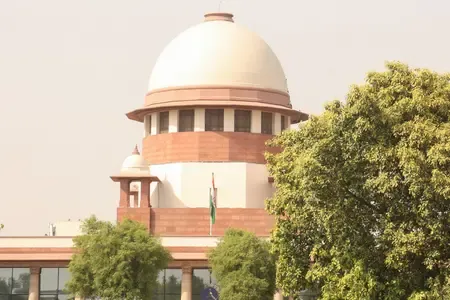Why Did the Shimla Court Order the Demolition of a Mosque?

Synopsis
Key Takeaways
- Shimla court upheld demolition of illegal mosque.
- Additional District Judge Yajuvinder Singh confirmed the ruling.
- Waqf Board's appeals were dismissed.
- Community tensions have escalated due to this ruling.
- Legal and social implications remain significant.
Shimla, Oct 30 (NationPress) A court in Shimla on Thursday reaffirmed the ruling from the Municipal Commissioner's Court to demolish the mosque in Sanjauli, situated on the outskirts of the capital of Himachal Pradesh. This decision has sparked significant protests as the mosque was deemed illegal.
Rejecting the appeals filed by the Himachal Pradesh Waqf Board and the Sanjauli Mosque Committee, Additional District and Sessions Judge Yajuvinder Singh ordered the demolition of all floors of the mosque, which has been officially classified as illegal.
On May 3, the Commissioner's Court mandated the Waqf Board and the Mosque Committee to take down the mosque after labeling it unlawful.
In response to the court’s ruling, both the Waqf Board and the Mosque Committee challenged the decision in the district court of Shimla.
However, the Sanjauli Mosque Committee indicated plans to escalate their appeal to the high court.
Advocate Jagat Pal, representing the petitioners, confirmed that the Waqf Board and the Mosque Committee had submitted two appeals in the district court.
Both of these appeals were subsequently dismissed by the district court.
"Now the entire mosque will be demolished," Pal shared with the media.
Previously, the Municipal Commissioner’s Court had ordered the removal of two additional floors of the mosque.
A similar directive was issued last year for the demolition of three floors.
The Waqf Board's counsel argued that the mosque existed prior to 1947 and was reconstructed after its earlier demolition.
However, Commissioner Bhupender Kumar Attri questioned why the requisite permissions, including architectural plans, were not secured from the municipal corporation for its reconstruction.
Additionally, the Waqf Board could not provide the mosque's revenue records during the court proceedings.
The Himachal Pradesh High Court had instructed the Municipal Commissioner to resolve this matter by May 8.
The Commissioner's Court issued the demolition order after considering both sides' arguments.
A communal conflict erupted in September last year when certain community members sought refuge in the mosque.
Local residents, supported by Hindu organizations, called for the demolition of what they claim is an unauthorized structure and demanded the registration of non-residents entering the state.









